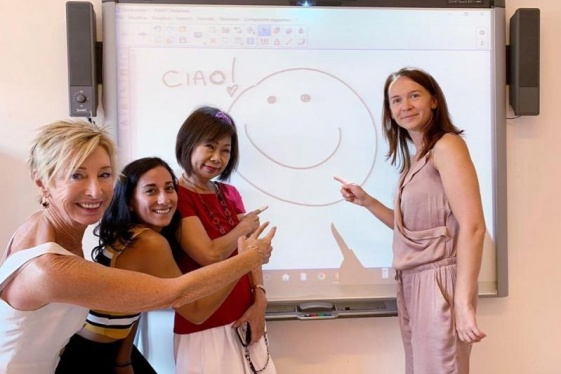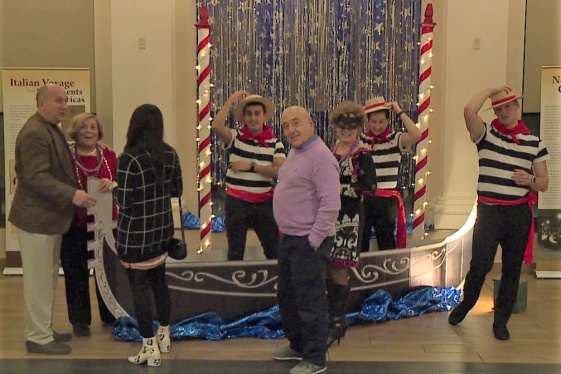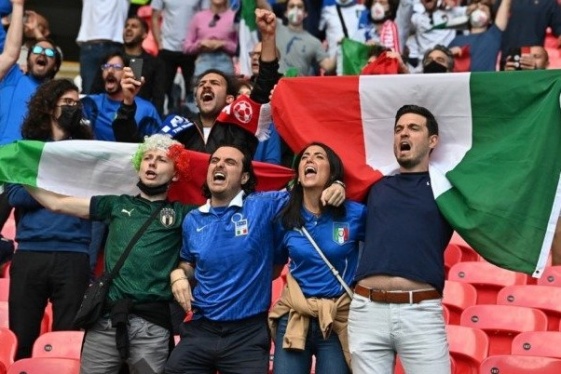

WTI Magazine #36 2014 June, 25
Author : Manuela Bianchi for learnitalygroup.com Translation by:
A travel into the language of the "Bel Paese"
Give me a "Potin" or give me a "vasata". Where do you use these words? I'll tell you right now: in Italy. "Potin" and "vasata" are just two of the many examples of dialect words in use in the various Italian regions. In this occasion I took as an example the Italian word "bacio" (kiss) to stress the language gap existing between different Italian regions. "Potin" and "vasata" mean "bacio" (kiss) respectively in the regions of Valle d'Aosta and Sicily.
But where does the word "bacio" come from? Like in most cases, the answer comes from the Latin, specifically from the Latin word basĭu (m), which subsequently became "bascio" to reach then its present form. In Italy this word can be used in predetermined phrases. For example, if you want to say that two people are kissing with a lot of enthusiasm, you can say that they are "mangiando o coprendo di baci" (eating or covering themselves with kisses).
In a figurative sense we often use another expression, namely "il bacio di Giuda" (Judas kiss), in order to refer to flatteries trying to hide a betrayal. And what does it mean if someone tells you that a thing or an action is successful "al bacio"? It means that everything went perfectly according to plan.
People could then eventually "baciarsi i gomiti" (kiss their own elbows)" if they were in a coveted but impossible situation, as is the act of kissing our own elbows. An example: "se avessi quella villa al mare, mi bacerei i gomiti" (If I'd own that villa over the sea, I'd kiss my elbows), as to say that affording to have that villa by the sea is an impossible event.
Another curiosity: in Sicily and other parts of the South there was the costume of kissing hands to people considered of a higher rank in social, economic and political terms. As time went by the costume of kissing hands just stopped, but the phrase "baciamo le mani" (I/we kiss your hand) became of ordinary usage as an expression to greet a person with reverence and respect, and today it is particularly used in an ironic way, if you want to emphasize someone's disdainful behavior.
Back to the dialect examples, we can take a look at how you say "bacio" in other Italian regions: in Puglia they "vasu", in Emilia Romagna "bès", in Umbria "becio", in Campania "vase", in Molise "vasce", in Basilicata "vèse", in Lombardy "basìn", in Veneto "baso" and so on. How many realities hide into our small and beautiful country!
Sounds and forms of Italian language
Italian grammar is quite a challenge. A few weeks ago, a student of our central
LearnItaly headquarters in New York asked a question which I think is interesting for everybody, including Italians: why the plural of "monologo" (monologue) is "monologhi" (monologues) and the plural of "meteorologo" (weatherman) is "meteorologi" (weathermen)?
Good question. The answer? Let's start by saying that when it comes to a Neo-Latin language, you always have to be patient. But let's look for a solution, and let's review
the rule of plural names that end in "-go". Generally in flat polysyllable words, those which have the accent on the penultimate syllable, we tend to keep the velar consonant, and so the plural will be "-ghi": for instance "albergo/alberghi" (hotel/hotels), "chirurgo/chirurghi" (surgeon/surgeons). On the contrary, words with a slippery accent assume a palatal sound and then we have "medico/medici" (doctor/doctors), "asparago/asparagi" (asparagus/asparagus), "intonaco/intonaci" (plaster/plaster) and so on.
And here are the first exceptions: "riepilogo/riepiloghi" (summary/summaries),
analogo/analoghi (analogous/analogous), "decalogo/decaloghi" (decalogue/decalogue), "monologo/monologhi"(monologue/monologues), "naufrago/naufraghi" (castaway/castaways), "omologo/omologhi" (homologous/homologous) and so on. We add another small peculiarity regarding the words that end with "-fago" and "-logo". In the first case plurals are formed with "-gi", like "esofago/esofagi" (esophagus/esophagus). In the second case, words or adjectives referring to things form the plural in "-ghi", while when words or adjectives are referred to professions, they form the plural in "-gi". The examples are those namely reported by our student: "monologo/monologhi" (monologue/monologues) and "meteorologo/meteorologi" (weatherman/weathermen).
There certainly are many exceptions, but remember that practice is the quickest solution to all problems, and that in case of doubt you can always consult the dictionary. Everything normal ... we too do it, often!
If you want to know more about how to learn Italian, go to www.learnitalygroup.com
You may be interested
-
Italian world language teacher 2015-2016
FRAMINGHAM PUBLIC SCHOOLS - JOB DESCRIPTION TITLE: World Language Teacher - Italian...
-
'Italy Stay Strong': What The Coronavirus Eme...
On the northern coast of Sicily, looking out toward the magnificent Aeolian Islands, Milaz...
-
‘Carnivale’ doubles as event to persuade YSU...
Lent begins next Wednesday but the Italian community of Youngstown celebrated their own Ma...
-
‘Il Canto degli Italiani’: What the Italian n...
The Italian football team and its fans are known for belting out rousing renditions of the...
-
‘In Other Words’ review: Jhumpa Lahiri’s love...
By Howard Norman Jhumpa Lahiri lived with her family in Rome in 2012. Though she...
-
‘Let’s Choose Three Words’: the Project dedic...
‘Let’s Choose Three Words’ is a new educational project promoted by the Ministry of Foreig...
-
‘Living in Rome’ talk accompanies Italian din...
An Italian Dinner and Talk on "Living in Rome: Duties, Distractions and Delights" will be...
-
‘Sons’ save Primavera program
A community program providing supplemental education in a foreign language to community ch...










